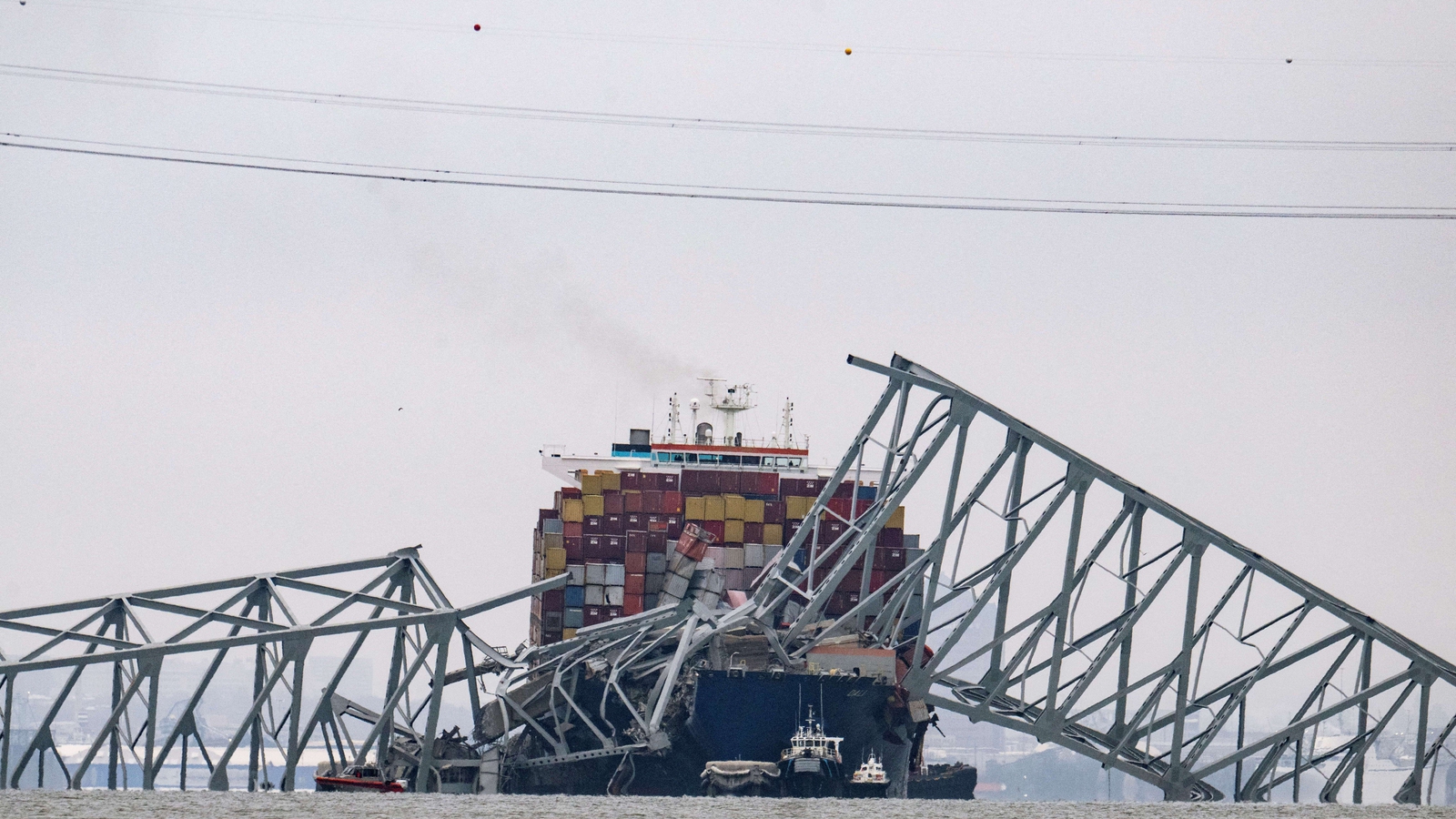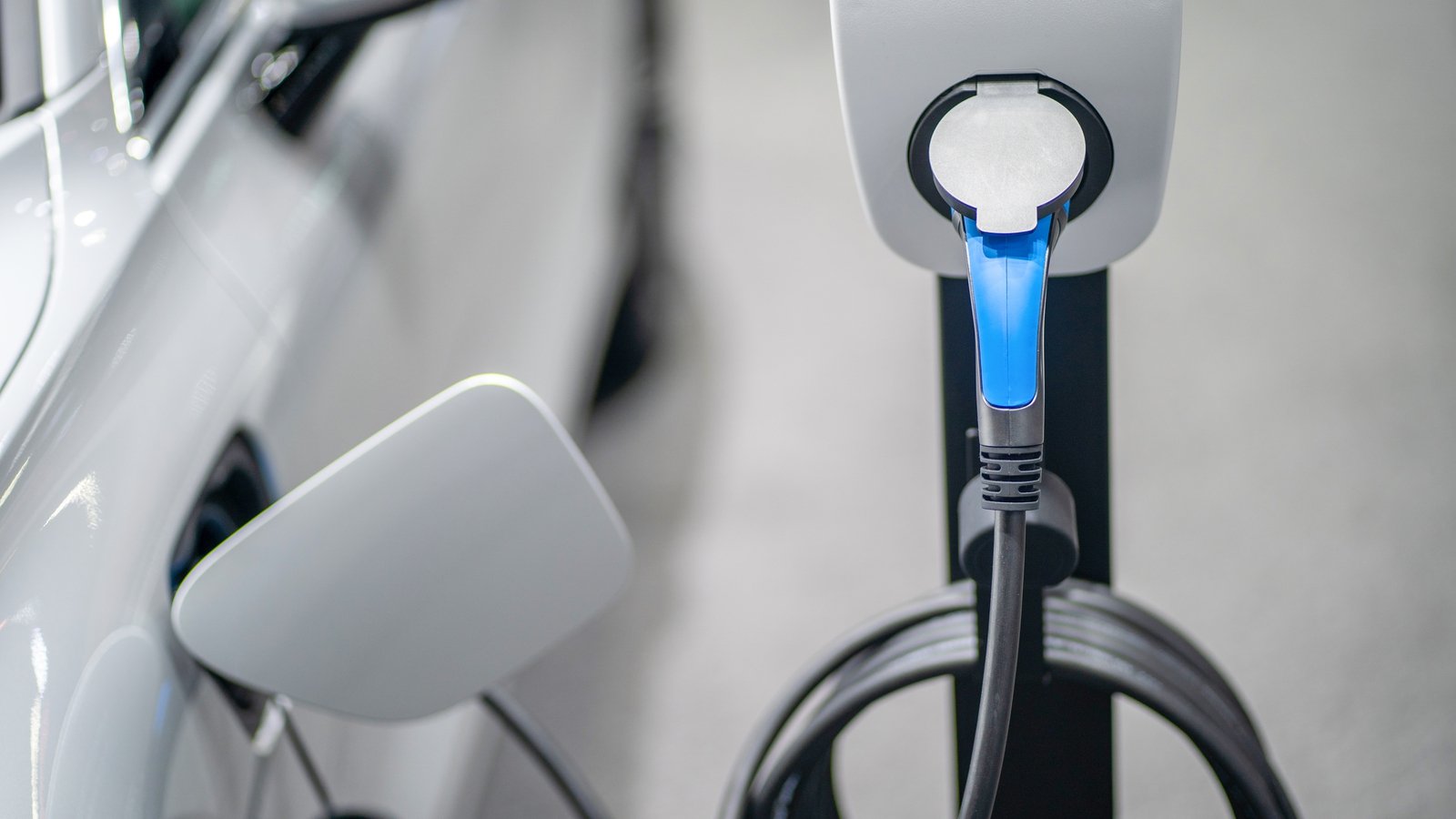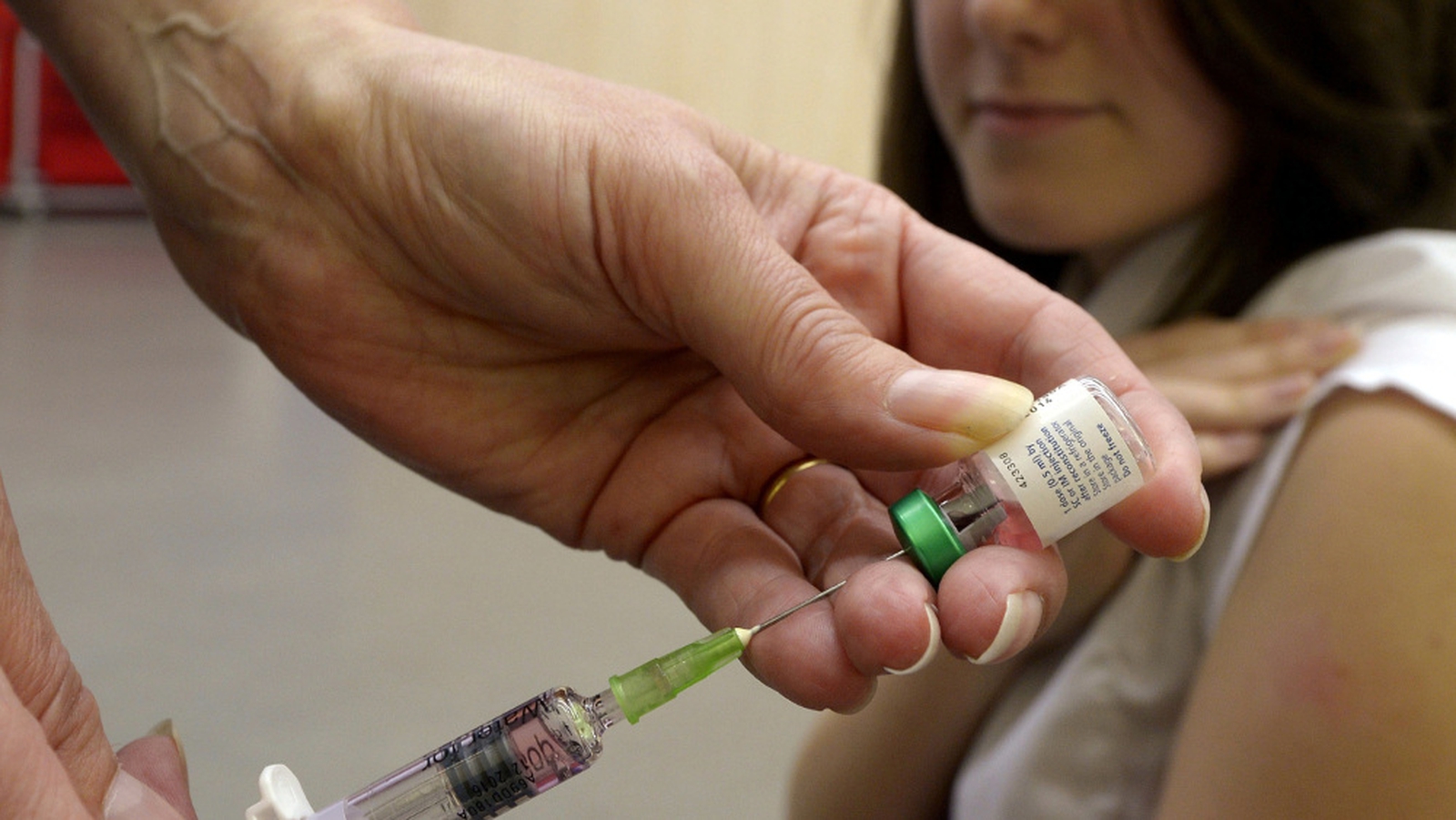Riders open up about dangers of delivery work
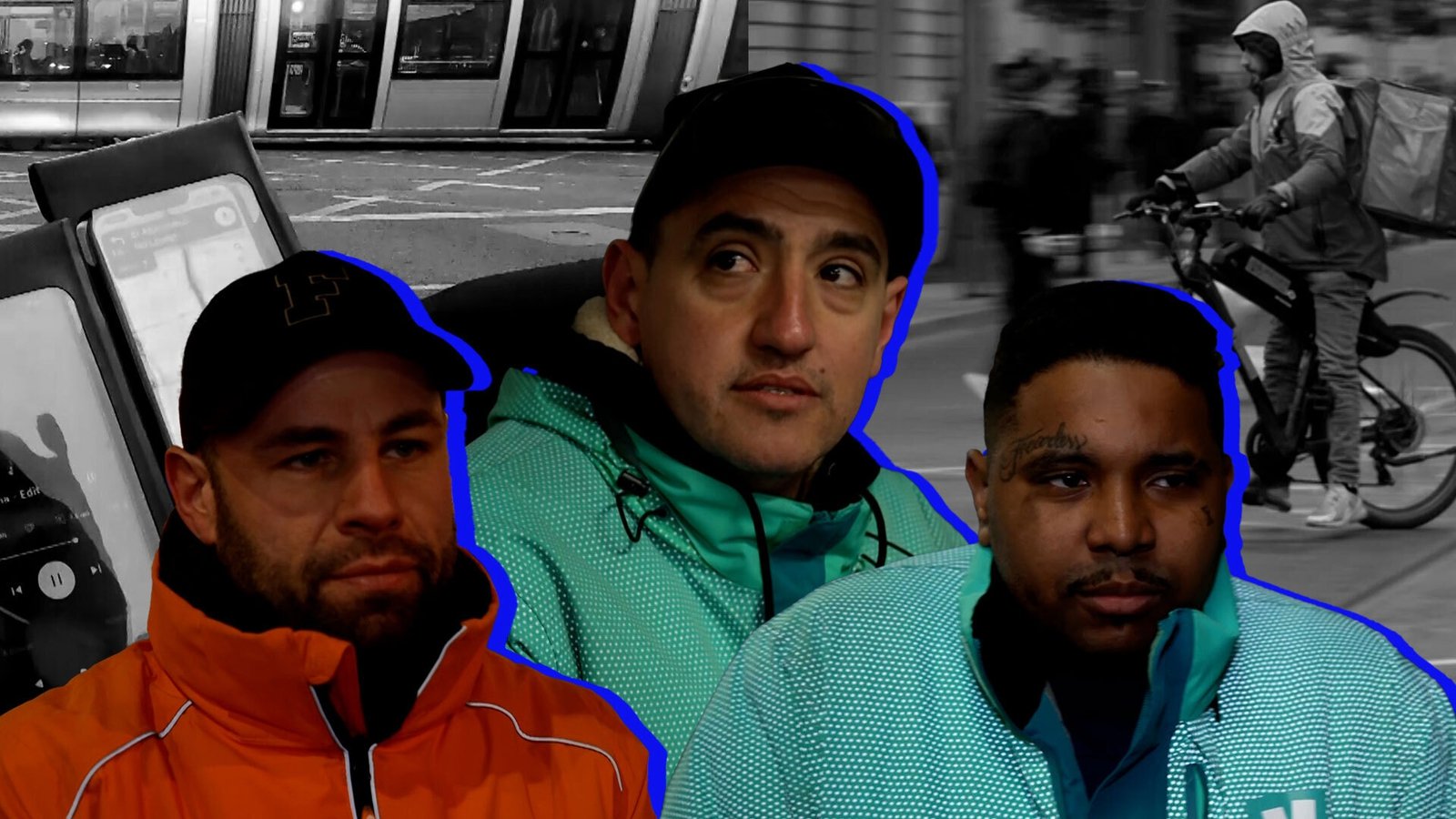
In a bike shop hidden down an alleyway off Dublin’s Moore Street, three Brazilian delivery riders discuss what they say is a rising number of xenophobic attacks on riders.
“I think that we have a gang against the Brazilian people here,” rider Luiz Fernando told Prime Time.
“I don’t know why, and I don’t know when, but they started to push us, to rob us, to rob our bikes, to attack us with rocks, with knives. Every day we have one or two situations,” Mr Fernando said.
The Seven Bikes shop, where electric bikes can be rented and repaired, has become a hub for Dublin’s Brazilian community.
Mr Fernando told Prime Time he’s angry about a recent series of unprovoked attacks on delivery riders.
“I swear to God, I hope this is just a phase, because when I talk to people who have already lived here, and relatives who have already lived here, they didn’t go through this,” Mr Fernando, said.
“It’s getting out of control,” he added.
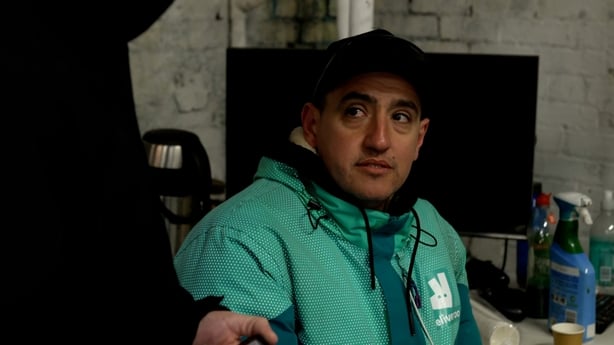
Brazilian delivery rider Felipe Carvalho was attacked and robbed by three men on Dublin’s Grafton Street last month.
Mr Carvalho, who also works as a rickshaw driver to supplement his income as a food delivery rider, was punched in the face, leaving him with a bloody nose and some bruising. His phone was also stolen.
Following the attack, with blood still on his face, Mr Carvalho posted about his experience on Instagram.
“So, everyone, take this as a warning, you really need to be careful on the streets, stay vigilant with your mobile phone because things are really bad.”
Speaking to Prime Time on the day he returned to work after the Grafton Street assault, Mr Carvalho said that he has lived in Brazilian cities such as Sao Paulo and Belo Horizonte.
“In those two cities, I have never had my phone stolen or been assaulted and it happened here,” he told Prime Time.
“Working on the streets of Dublin at night, in the city centre, from the time I have been living here, I have noticed that it’s getting more and more dangerous every day.”

News of attacks on delivery riders in Ireland has reached Latin America.
In the last fortnight, Record TV, which is the second largest commercial TV station in Brazil, broadcast a news report about “the wave of anti-foreigner violence in Ireland, with Brazilians particularly targeted”.
Another rider who spoke to Prime Time said he’s now afraid of what he might encounter while out delivering on the streets of Dublin.
“We are not here to rob jobs or anything,” Denner da Cunha said, adding that he is beginning to fear customers.
“When I’m delivering an order, I don’t know what to expect from customers – if he try to attack me or maybe just say compliments. So, I just keep afraid.”
Mr da Cunha said there are also times when riders are intimidated by gangs of teenagers.
“They have these North Face tracksuits, the grey ones, and they just don’t like immigrants.”
When asked if there are areas in Dublin where they will not deliver at night, several of the riders speaking to Prime Time mentioned Cabra, Ballymun, Finglas and Ballyfermot.

Fiachra Ó Luain from the English Language Student Union (ELSU), has been campaigning to improve riders’ pay and conditions since 2020.
“If you arrive in this country and you don’t have much English, it’s an attractive option initially because basically you can rock up to somewhere and you pay a deposit, you rent a bike, and then you rent an account from somebody who owns one – the named account holder,” he told Prime Time.
Most riders are working in Ireland through a study visa that allows them to work 20 hours a week.
The visas don’t make provision for self-employment so the riders cannot apply directly to work for the delivery platforms. But there is a workaround.
“In order to have an account with Deliveroo, Just Eat, Uber Eats, they must be either Irish, European citizen or have a Stamp 4 visa. What happens then is that the person who is the named account, very often will rent that account out to somebody else, making a passive income from the labour of somebody else,” Mr Ó Luain said.
“Basically, what you have is a two-tier labour system and the creation of a subclass of worker who is not guaranteed minimum wage, very often much less, around half of that, and can work up to 14 hours a day for €70, and it’s a lottery.”
A lot of riders pay between €50 and €100 per week to rent a delivery account from somebody else. Overall, Mr Ó Luain says riders have overheads of around €170 a week.
“That’s what they have to clear, at least before they make any profit for themselves to live in one of the most expensive cities in Europe,” he said.
Cost of living
Ali Mohammed has been working as a delivery rider since he arrived in Ireland from India a few months ago. His biggest concern since arriving here has been the cost of renting somewhere to live.
Mr Mohammed says he is paying €680 for a bed in a room with two others, who are also paying €680 each. He is sharing the house with seven other people.
Mr Mohammed, as well as many of other riders who spoke to Prime Time, said that he earns approximately €1 per kilometre cycled.
Prime Time is aware of a female rider from Latin America who was hit by a car while riding her delivery bike in February.
She is not proficient in English and was so afraid that she may face huge medical bills that she got out of the ambulance that came to take her to hospital after the collision. She has recovered from a leg injury and is back working.
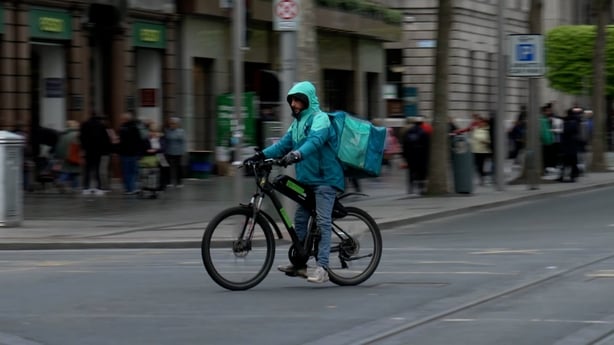
Many of the riders communicate and warn each other of potential dangers, through WhatsApp groups.
Prime Time was given access to one of the WhatsApp groups for a month and found that one of the most common issues for riders is bike theft.
Every other day, one of the riders has their electric bike robbed. They all have their bikes fitted with GPS trackers, so they can find where the stolen bike ends up.
Some of them notify gardaí, others go to where the bike is and try to retrieve it.
Concerns about pay and conditions are another constant feature of the WhatsApp group chat.
Last week, the riders were furious when one of the delivery apps offered just 34 cents to collect a second order from a restaurant on Dublin’s Camden Street and take it to an address in Rathmines.
On Valentine’s Day, coinciding with similar action in the UK, the US and across Europe, food delivery riders in Dublin went on strike demanding better pay from apps such as Deliveroo, Uber Eats and Just Eat.
Riders claim the minimum payment per delivery in Ireland has reduced from €4.30 in 2019 to €2.90 today. They say the pay regularly fluctuates where they might earn €400 one week, and €600 the next.
Many of them work long days to earn enough money to get by. Some of them say they get an average of two deliveries per hour – but they can end up waiting for 30 minutes on a restaurant to prepare an order.
One rider told us he makes between €60 to €80 in ten hours between Monday and Thursday, and this rises to between €80 and €120 per day at weekends.
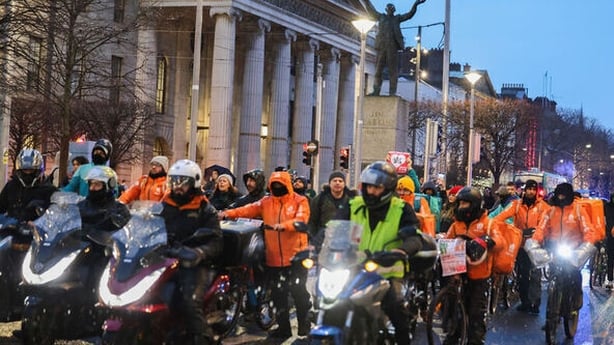
A spokesperson from the online food ordering platform Deliveroo told Prime Time that it aims to “provide riders with the flexible work riders tell us they value, attractive and competitive earning opportunities and protections”.
“Riders earn at least the national minimum wage plus costs for the time they are working,” the statement added.
The company also said that it offers riders free insurance, sickness cover, financial support when riders become new parents and training opportunities.
A spokesperson from food delivering platform Just Eat said “couriers earn, on average, significantly more than national minimum and living wage for the time they are on an order”.
Deliveroo and Just Eat maintain they operate fully within legal requirements, including rules for usage of an account by another party. Prime Time also understands that since last month, Deliveroo has been rolling out facial recognition technology to strengthen the identification process for those using accounts on its platform.
Prime Time contacted Uber Eats for comment but it did not respond.
Food delivery and takeaway orderings is big business, where total annual spend in the Irish market is €2.2 billion, according to a food delivery report published by Just Eat in 2023.
Citing a survey, Associate Professor in Human Nutrition at UCD Dr Breige McNulty told Prime Time that Irish people get 15% of their calories from takeaway meals.
Restaurant industry
The restaurant industry is also critical of food delivery platforms as some of them charge a commission of 30%.
A Deliveroo spokesperson said it works with over 2,000 Irish restaurants. “Our commission rates are competitive and mean restaurants don’t need to provide delivery services themselves.”
Just Eat said that “despite rising external costs, our rates for restaurant partners remain extremely competitive in the market”.
“We believe our commission rates are aligned with the value we provide to our partners, and we have a track record of helping restaurants prosper,” the company said in a statement.
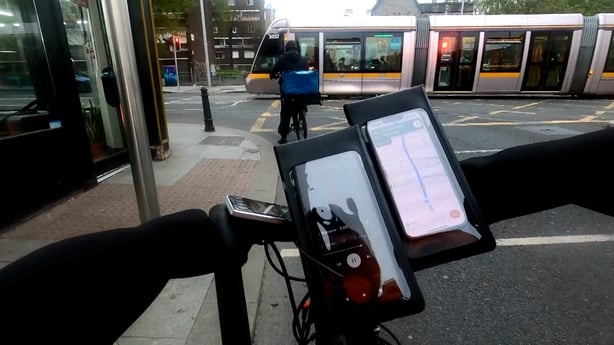
The food delivery platforms are often criticised as the delivery riders’ work involves them working to the tune of their algorithms and the riders are, as the English Language Students Union (ELSU) put it – under “algorithmic control”- that dictates their workflow and pay rates.
There’s a view that the role of algorithms in the day-to-day jobs of food delivery riders is a sign of things to come for other professions.
Dr Sally Applin, an expert in algorithms and automation based in Silicon Valley, told Prime Time that “we are experiencing an acceleration of different professions becoming automated”.
“The people that think that their profession will not be automated or they won’t attempt to automate the profession are not paying attention,” Dr Applin added.
Last month, the European Parliament approved new rules where platform workers may be classed as direct employees instead of contractors in future.
The rules also regulate the use of algorithms in the workplace. EU member states now have two years to transpose that decision into national law.
Back in Seven Bikes shop, the Brazilian riders are hoping things will improve. Matheus Tanner says that life in Ireland does not live up to expectations for many Brazilians.
“It’s concerning because you come here wanting a better life, and you end up being sold a dream that doesn’t exist. You come here and it’s a totally different reality.”
Reporter Conor McMorrow and producer Aaron Heffernan’s report will broadcast on the 21 May edition of Prime Time on RTÉ One and RTÉ Player.


